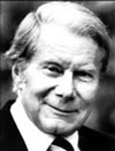
 Book Information: The Libertarian Theology of Freedom. Opitz, Edmund A. Tampa, FL: Hallberg Publishing Corporation, 1999. 160 pages.
Book Information: The Libertarian Theology of Freedom. Opitz, Edmund A. Tampa, FL: Hallberg Publishing Corporation, 1999. 160 pages.
Only recently have I learned of Edmund Opitz, ordained Congregational minister and one of the great spokesmen of the liberty movement in the 20th century. Opitz was the resident theologian for the Foundation for Economic Education (FEE), and a long-time senior staff member there. He helped found The “Nockian Society,” which helped keep Albert Jay Nock’s writings in print, and “the Remnant,” a small organization named for the subject of Nock’s essay entitled Isaiah’s Job. He was a good friend of Murray Rothbard and many, many others in the liberty movement. He joined his Lord and Savior Jesus Christ in glory in 2006, leaving this world much better than he found it.
The Libertarian Theology of Freedom is a compilation of seven essays from Opitz’s other books: The Powers That Be, The Kingdom Without God, and Religion: Foundation of a Free Society. (He has another highly regarded book not represented here: Religion and Capitalism: Allies, Not Enemies.) For essentially a collection of republished essays, the quotes that line the covers indicate how highly regarded Opitz was – and still is:
“A must read to better comprehend the important linkage between religious principles and individual liberty.” – Ron Paul
“A wonderful book – each sentence a testament to Reverend Opitz’s cool head and warm heart.” – Thomas Szasz, M.D. Professor of Psychiatry
 Much of the book addresses the so-called “social gospel,” a major theme of Opitz’s work throughout his life. Opitz exposes how the social gospel is built on a faulty view of Scripture and human nature, and of course a deficient understanding of economics (chapters 3 & 4). What is more, he has traced the history of thought that led to the social gospel movement in the early 20th century (chapter 5). This is something I have never seen presented before, not even in my class on Christianity in America. Insights such as these are critical as we combat the resurgence of social gospel advocates like Jim Wallis and his “Sojourners” crowd of state-loving neo-liberal Christians. The social gospel is socialism with a Christian veneer.
Much of the book addresses the so-called “social gospel,” a major theme of Opitz’s work throughout his life. Opitz exposes how the social gospel is built on a faulty view of Scripture and human nature, and of course a deficient understanding of economics (chapters 3 & 4). What is more, he has traced the history of thought that led to the social gospel movement in the early 20th century (chapter 5). This is something I have never seen presented before, not even in my class on Christianity in America. Insights such as these are critical as we combat the resurgence of social gospel advocates like Jim Wallis and his “Sojourners” crowd of state-loving neo-liberal Christians. The social gospel is socialism with a Christian veneer.
Opitz is a serious and vigorous defender of economic freedom and private property (or do I repeat myself?). He shows himself a respectful debater in his exchange of letters with Rev. John Bennett of Union Theological Seminary in chapter 1. It is almost embarrassing to see the opposing side smashed so readily. Opitz demonstrates clearly the compatibility of Christian faith with libertarian thought, and that with sharp wit. He calls Bennett out for having two standards of morality – one for individuals and one for those in power. In doing so he challenges the very notion of the State itself, for what is the State but a group of people who make certain actions illegal for others but legal for themselves to do?
“Power ministers to human pride and results in spiritual disaster.” – Edmund Opitz
Opitz understands the meaning of individualism, a concept that is often lost in the modern church. We frequently hear that “there is no place for individualism in the church,” but this constitutes a misunderstanding of individualism. What those people mean is, “You cannot be in Christ without the body of Christ – his church,” and this is absolutely true. However, this is taken much too far and has resulted in fuzzy philosophy and theology – promoting collectivism rather than community. At its core, individualism means the individual is responsible for his own actions, in particular before God, and thus individual liberty is important for living out the dictates of conscience. Individualism is not atomism: “We have no inclination to be hermits; we are social creatures, and we achieve our full humanity only in association, in mutuality, and in community.” Voluntary action is the very essence of community, and thus the collectivist is actually acting against the true community he seeks to promote.
The Libertarian Theology of Freedom is an important book for the libertarian Christian to have on his bookshelf. It accomplishes its goal of introducing a new reader to Edmund Opitz and his work, even though one can find each of these essays in other books as well. I highly recommend it for any thinking Christian.
As I mentioned, the work of Edmund Opitz is a new discovery for me. I had no idea that he existed mere months ago. Once again, I am thrilled to find out that great men of faith have been paving the way for liberty, and it shows that we have a superb intellectual tradition within the body of Christ to assist our efforts now. I plan to get my hands on whatever I can find from Opitz and help spread his work to others. I hope you also will pick up his books and gain as much as I have from them.
“In today’s world, the term ‘libertarian Christian’ seems to many people to be an oxymoron. It is not. It exemplifies nothing less than the true meaning of the teachings of Jesus.” – Charles Hallberg, from the Foreward to The Libertarian Theology of Freedom.
——
UPDATE: It can be somewhat difficult to find Opitz’s books on Amazon, but make sure to check out the Amazon Marketplace sellers and you can save yourself some cash. For instance, there are right now 13 copies of The Libertarian Theology of Freedom available on Amazon Marketplace for less than $5 plus shipping.

Articles posted on LCI represent a broad range of views from authors who identify as both Christian and libertarian. Of course, not everyone will agree with every article, and not every article represents an official position from LCI. Please direct any inquiries regarding the specifics of the article to the author.
Did you read this in a non-English version? We would be grateful for your feedback on our auto-translation software.
), //libertarianchristians.com/wp-content/plugins/smartquizbuilder/includes/images/template6-latest.jpeg))

), https://libertarianchristians.com/wp-content/plugins/smartquizbuilder/includes/images/template6-latest.jpeg))








































), https://libertarianchristians.com/wp-content/plugins/smartquizbuilder/includes/images/template6-latest.jpeg))
), https://libertarianchristians.com/wp-content/plugins/smartquizbuilder/includes/images/template6-latest.jpeg))
), https://libertarianchristians.com/wp-content/plugins/smartquizbuilder/includes/images/template6-latest.jpeg))





*by signing up, you also agree to get weekly updates to our newsletter
Sign up and receive updates any day we publish a new article or podcast episode!